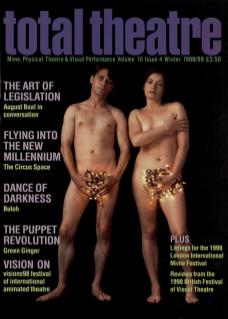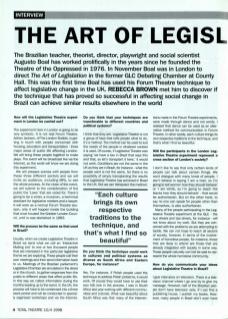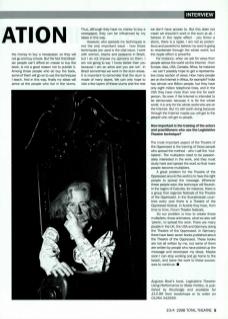How will the Legislative Theatre experiment in London be carried out?
The experiment here in London is going to be very symbolic. It is not real Forum Theatre. Adrian Jackson, of The London Bubble, is getting in touch with people concerned with housing, education and transportation – three major areas of public life affecting London. We will bring these people together to make plays. The event will be broadcast live via the Internet, so the world will know we are doing this experiment.
We will prepare scenes with people from these three different sectors and we will invite an audience, including MPs, to see the whole process. At the close of the event, we will submit to the consideration of the public the 'Laws' that are voted for. There's going to be a writer, a musician, a technical assistant for legislative matters and a lawyer. It will work as a normal Forum Theatre session, only it will happen inside the building that once housed the Greater London Council, until is was abolished in 1983.
Will the process be the same as that used in Brazil?
Usually, when we create Legislative Theatre in Brazil we send what we call an ‘Interactive Mailing List' to one or two thousand people that are interested in the particular legislative theme we are exploring. These people call their own meetings and then send information back to us. Meetings of the Brazilian parliament's Legislative Chamber are simulated in the street or in the church, to gather responses from the public to different areas that affect public life. In this way we collect information during the months leading up to the event. In the UK, the process will have to be condensed into a three-week period and will be conducted in specially organised workshops and via the Internet.
Do you think that your techniques are transferable to different countries and political systems?
I think that they are. Legislative Theatre is not a group of laws that tells people what to do, it's a method. The method can be used to suit the needs of the people in whatever context it is used. Of course, if Legislative Theatre was saying 'we have a law in Brazil that says this and that, so let's transplant it here', it would not work. Conditions are not the same in the UK as they are in Brazil, for instance – what the people want is not the same. So there is no possibility of simply transplanting the results that Legislative Theatre has achieved in Brazil to the UK. But we can transplant the method.
Do you think the technique could work in cultures and political systems as diverse as South Africa and Eastern Europe, for instance?
Yes. For instance, if Polish people used the technique to address Polish problems, it would work. Of course they would have to use their own folk lore in the process. I was in South Africa last year working with different communities and cultures. What was beautiful about South Africa was that many of the interventions made in the Forum Theatre experiments, were made through dance and not words. I realised that dance can be used as an alternative method for communication in Forum Theatre. In other words, each culture brings its own respective traditions to the technique, and that's what I find so beautiful.
Will the participants in the London Legislative Theatre experiment represent a cross section of London's society?
I don't like to say that only certain kinds of people can talk about certain things. We want dialogue with many kinds of people. I don't believe in saying 'I am a man, so I'm going to tell women how they should behave’ or 'I am white, so I'm going to teach the blacks how they should behave' – that would be authoritarian. But on the other hand, to say no one can speak for people other than themselves, is also authoritarian.
Many of the people participating in the Legislative Theatre experiment at the GLC – the bus drivers and taxi drivers, for instance – will not know about my work. But they are concerned with the problems we are attempting to tackle. We cannot hope to reach all sectors of society, however. In terms of the involvement of homeless people, for instance, those that are likely to attend are those that are already integrated with society in some way. These people naturally can not be said to represent the whole homeless community.
How do you communicate your ideas about Legislative Theatre in Brazil?
I give interviews on television. There is a television channel where I go and try to give my message. However, half of the Brazilian people don't have television sets. If I can find a publishing house, I publish my books. However, many people in Brazil don't even have the money to buy a newspaper, so they will not go and buy a book. But the fact that Brazilian people can't afford en masse to buy the book, is not a good reason not to publish it. Among those people who do buy the book, some of them will go on to use the techniques I teach. And in this way, finally my ideas will arrive at the people who live in the slums. Thus, although they have no money to buy a newspaper, they can be influenced by my ideas in this way.
However, who spreads my techniques is not the only important issue – how those techniques are used is the vital issue. I work with women, blacks and peasants in Brazil, but I do not impose my opinions on them. I am not going to say 'I know better than you because I am an artist and you are not'. In Brazil sometimes we work in the slum areas. It is important to remember that the slum is made of many layers. We can only hope to visit a few layers of these slums and the rest we don't have access to. But this does not mean we shouldn't work in the slum at all. I believe in the ripple effect – you throw a stone, there is a ripple. I am not so pretentious and powerful to believe my word is going to reverberate through the whole world; but the ripple effect is powerful.
For instance, when we ask for views from people across the world via the Internet – from Europe, Asia, USA, Canada, Africa, for instance – we can't possibly hope to get a representative cross section of views. How many people are on the Internet in Africa, for example? India has almost one billion people, but they have only eight million telephone lines, and in the USA they have more than one line for each person. So even if the Internet is intended to be democratic because it is for the whole world, it is only for the whole world who are on the Internet. But it's still worth doing because through the Internet maybe you will get to the people who will get to people.
How important is the training of the actors and practitioners who use the Legislative Theatre technique?
The most important aspect of the Theatre of the Oppressed is the training of those people who spread the method – who I call the 'multipliers'. The multipliers need to be passionately interested in the work, and they must study hard and spread the word so that more people become multipliers.
A great problem for the Theatre of the Oppressed around the world is to have the right people to spread the message. Wherever these people exist, the technique will flourish. In the region of Calcutta, for instance, there is a group that organise festivals of the Theatre of the Oppressed. In the Scandinavian countries every year there is a Theatre of the Oppressed festival. In Austria they have, from time to time, Forum Theatre festivals.
So our problem is how to create those multipliers, those animators, what we also call ‘jokers', to spread the work. There are many people in the UK, the USA and Germany doing the Theatre of the Oppressed. In Germany there have been seven books published about the Theatre of the Oppressed. These books are not all written by me, but some of them are written by people who have picked up the message and developed my ideas. Maybe soon I can stop working and go home to the beach, and leave the work to these successors to continue.
Augusto Boal's book, Legislative Theatre: Using Performance to Make Politics, is published by Routledge and available for £14.99 from bookshops.


